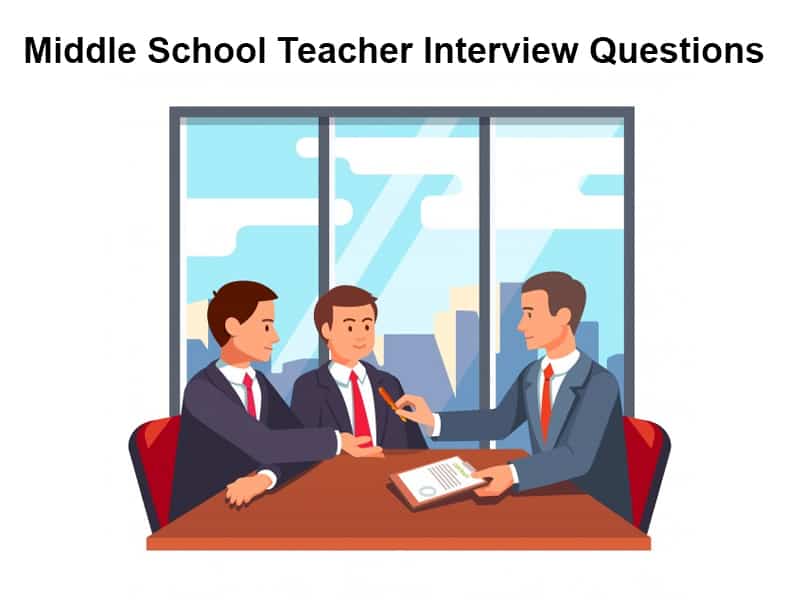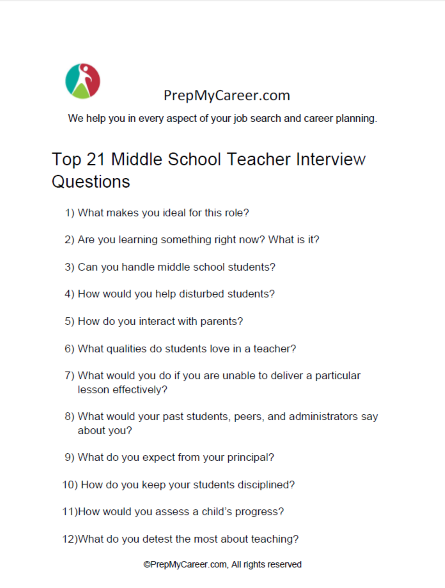You have landed an interview for the post of a middle school teacher, but now that you look forward to it, you are getting nervous. You require good practice with some commonly asked interview questions asked to know how knowledgeable you are and how well you can handle adolescents.
Table of Contents

Sample School Teacher Interview Questions with Answers
What makes you ideal for this role?
If you have previous experience,
I have closely worked with students between the age group of 11 to 14 years for the past______years. I have an interest in empowering and shaping young minds and believe that teachers impact students’ futures. I have a_______degree in education from________. After that, I have worked as a teacher assistant in________school for one year, and then I got promoted to the role of teacher.
I studied child and adolescent psychology while I was teaching at________school to know better about the behavior and psychology behind it. Backed by prerequisite knowledge and a vision to change lives, I decided to apply for this position.
If you are a fresher,
I just completed my________degree in education from________. Along with pursuing a degree in education, I have also studied child and adolescent psychology to study behavior and psychology. Backed with knowledge and passion in impacting the lives of students, I wish to embark on my professional journey with this opportunity.
2. Are you learning something right now? What is it?
Yes, I am currently studying educational psychology as I wish to help students to learn in a better way. I desire to help children use the knowledge they gain to lead a successful life. Education can shape children’s lives, and imparting it in the best of ways is the responsibility of a good teacher. I do not only wish to be a good teacher. I aim to be the best teacher a child has ever met.
3. Can you handle middle school students?
Yes, I believe that students at this age need emotional support to deal with the changes they are going through mentally and physically. These changes can lead to developmental issues, and helping them through it with patience can transform them into responsible citizens.
4. How would you help disturbed students?
Teachers can help them solve these issues by paying attention and guiding them. I will have a personal counseling session with the student. In the session, I will help him/her to open up with me. When I get to know the real cause behind the issue that is disturbing him/her, I will try to find a solution to it. If I am not capable of solving it by myself, I will take the help of seniors and parents.
5. How do you interact with parents?
I make it a point to have a one on one interaction with parents when the session starts to get to know the child in a better way. Every child is unique and has unique needs. I make sure that parents are aware of their child’s progress throughout the session. I send occasional reports to be signed by parents, inform them through letters and invite them for an open discussion whenever they need to.
6. What qualities do students love in a teacher?
I believe that students love a teacher who is open-minded, caring, understanding, motivating, and disciplining at the same time. The teacher should be accessible but authoritative. Different students have different learning styles and paces, and a good teacher caters to every student’s needs. Students love someone who would make the classroom a fun place rather than a boring one.
7. What would you do if you are unable to deliver a particular lesson effectively?
I will try to analyze what went wrong and ask questions about the particular topics to gain clarity about what the students failed to grasp. I will then try to deliver it in a different style. If the students fail to understand after a few attempts at it, I will take the help of experienced teachers.
8. What would your past students, peers, and administrators say about you?
My past students, peers, and administrators would use the three E’s to describe me: encouraging, engaging, and empathetic. My past students showed an overall improvement from academics to the practical implementation of the concepts. I have always used holistic learning in my teaching style, and my past administrators appreciated me for the development it brought in the students.
9. What do you expect from your principal?
I believe that a principal plays a vital role in the overall development of not only the school but also the teachers and students. So, the principal needs to be authoritative, encouraging, have a high vision and have good communication skills. S/he should be commanding and approachable at the same time.
10. How do you keep your students disciplined?
I believe that teachers should be friendly and discipline the students at the same time. The class environment should be fun with limitations and boundaries. The students should never take the teacher’s words and actions for granted. I would give them fun assignments to keep them alert and active. I would also ask questions from the lessons to the students I suspect aren’t paying full attention, but if they do not co-operate, I will punish them as per the school’s rules after a few warnings.
11. How would you assess a child’s progress?
I encourage students to initiate in class, ask questions, arrange games related to classwork, assign projects, take surprise tests. Combining formal as well as informal ways, I try to keep a balance of fun.
12. What do you detest the most about teaching?
I detest it when parents are non-cooperative and do not understand their importance in a child’s growth. It has a severe impact on the child’s overall development. I encourage them to have a private meeting with me. I explain the consequences it is having on them, then discuss an action plan with them. If I see no significant change in the child’s growth, I discuss the issue with the principal and other seniors.
13. How would you teach a mixed batch of fast and slow learners?
I believe that each student is different, and so I make sure to pay special attention to the slow learners. I ask questions during class, after class and arrange extra classes for these students. I pair fast learners with slow learners so that they can help each other. Teaching can benefit the fast learners in learning concepts faster while slow learners will be able to grasp it in a better way.
14. How did you start teaching?
I discovered the love for teaching early on in my career. When I had just entered my Graduation Course, I loved to help my peers with the topics they struggled to grasp. Due to some financial issues in the family, I started to take private tuition. That’s how my career started.
15. What motivates you to teach?
I love to help others and empower people’s lives, and teaching aids me to do both. Whenever I see a student progressing, it gives me a boost. It also helps me to put my learning to practice.
16. What do you like to do in your free time?
Most of the days, you will find me curled in a cozy corner of my house with a cup of chocolate and a book in my hand, while on weekends, I like to have a barbeque night with my friends in my backyard. I also enjoy road trips and exploring new places.
17. How would you start the first day of the session?
I will have an ice-breaking activity and arrange in-class games for them. After that, I will discuss the responsibilities, rules, and guidelines they need to follow. I will also show them the lesson plans I have for them. I will give them a detailed schedule of their classes.
18. What should a teacher avoid doing?
A teacher shouldn’t be biased with his/her students. S/he shouldn’t leave weak students to cover up on their own. A teacher shouldn’t mix her personal and professional lives. A teacher shouldn’t be overdemanding but understand the pace of the student’s learning.
19. What is meant by holistic learning?
Holistic learning engages all aspects of the learner, including mind, body, and spirit. It makes learning fun, natural, engaging, and meaningful. It encourages students to use their creative skills in learning.
20. What is the biggest challenge facing teachers today?
Schools have gone virtual. It is a challenging task to teach online as you cannot form a bond with the students. It is very distracting for students as they get access to the internet, and without supervision, they may use it for the wrong purposes.
21. Do you have any questions or queries you would like to ask?
What are you expecting to see in a teacher holding this position?
Will I have to go through any training or probation period before getting hired?
Can I continue my education along with teaching?
Conclusion
Best of luck! Do use this as a resource for a better interview. The more creative your answers will be, the better your impression during the interview. If you wish to ask or share something, leave a comment below, and remember the more you share, the more people we have an opportunity to help.
Download the list of questions in .PDF format, to practice with them later, or to use them on your interview template (for Middle School Teacher interviews):
